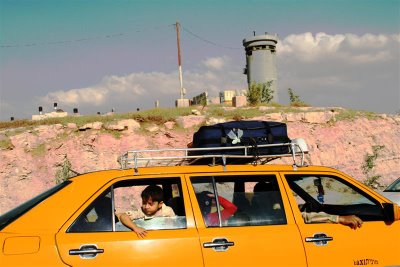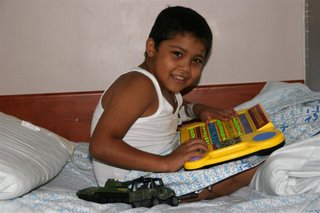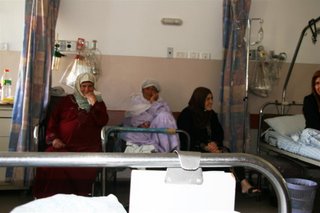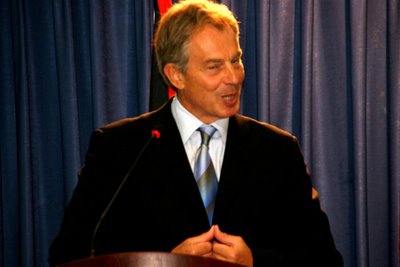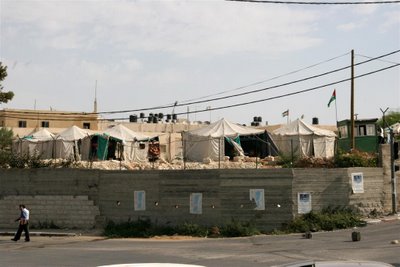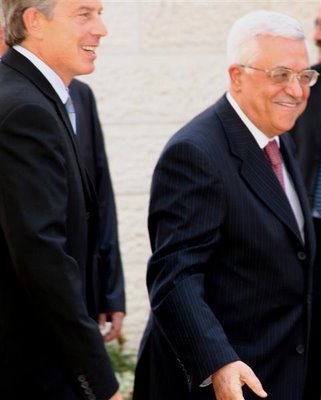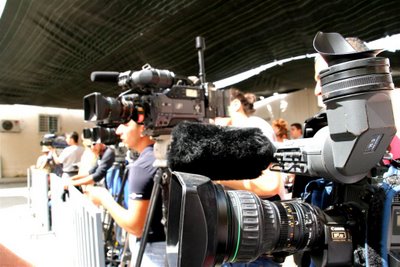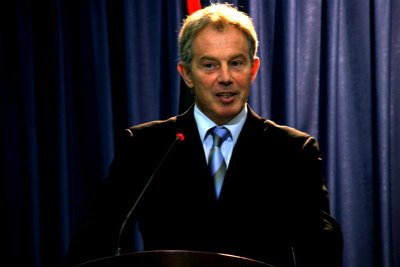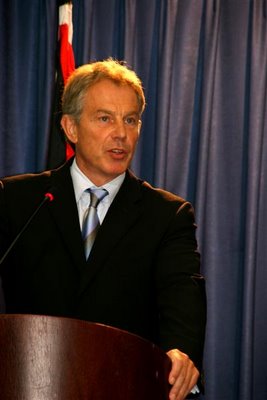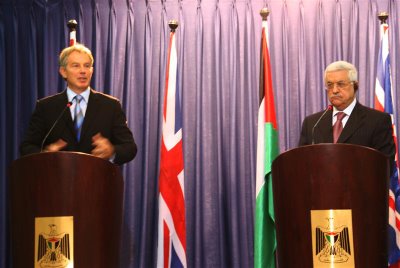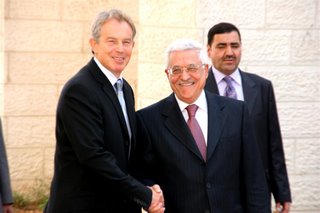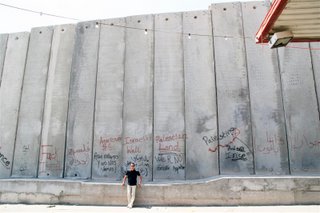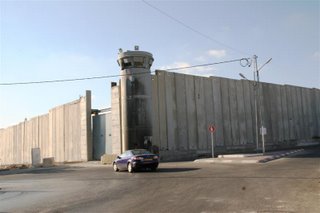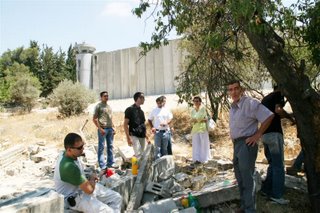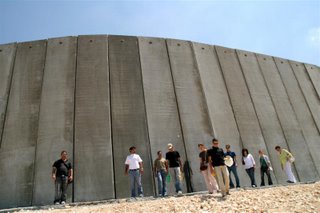Dimanche 17 Septembre, 2006
Aujourd’hui je me suis rendue à l’hopital Maquassed de Jerusalem pour visiter une amie palestinienne. Dans la chambre j’ai été très touchée par Amjad, un enfant très beau de 8 ans de Gaza. Il a été fauché par des balles tirées d’un tank israélien lors d’une incursion israelienne. Les balles «dumb dumb » ont des effets devastateurs, elles explosent en des centaines de fragments et dechiquent les membres et les os. Il a été touché aux jambes alors qu’il se trouvait au pas de sa porte. Un des jambes a pu être sauvé mais pas l’autre. Il est ravi que je le prenne en photo et se saisit de mon appareil ; tres vite il comprend et mitraille de photo les autres dans la chambre. J’adore son sourire et ses yeux rieurs. Ironiquement il joue avec des tanks. Sa grand-mere nous explique la vie à Gaza. Depuis le kidnapping d’un soldat israélien, l’armée israélienne a mené une operation d’envergure qui vise à punir toute la population de Gaza. Elle nous explique qu’ils n’ont l’electricité que quelques heures par jour(l’armée israélienne a deliberement ciblé et detruit les centrales electriques), et comme les pompes à eau dependent aussi de l’electricité, l’eau aussi se fait rare. Elle nous a aussi expliqué combien les hopitaux manquent de tout, pour venir la famille a dû payer 2,000 NIS à l’ambulance israélienne, soit 400 euros le prix d’un billet d’avion Tel-Aviv-Paris !
Depuis le début de l’opération, les chiffres sont alarmants. ce sont pres de 270 civils qui ont été tués, dont un cinquieme sont des enfants. Plus de 1200 palestiniens ont été blessés, et il y a un nombre très élevé d’amputations (60). Gaza, la plus grande prison à ciel ouvert, s’enfonce chaque jour en silence. Le sourire de Amjad est beau et dechirant à la fois.
Today I have been visiting one of my Palestinian friends at the Maquassed located in East Jerusalem. In the room I have been moved by Amjad, a beautiful kid from Gaza. He was shot by Israeli soldiers from a tank during an incursion in Gaza. The “dumb dumb” bullets have devastating effects. They explode into thousands of pices that tear down the flesh and bones. Amjad was injured in both legs while he was just standing in his doorstep. One leg has been saved but not the other one. He was so pleased that I was taken pictures of him and he offered me his gorgeous smile. But soon enough he took my camera, and took some pictures around. I love his smile and smiling eyes. Ironically he was playing with tanks. Her grandmother who came with him told us about the hard life in Gaza. Since the kidnapping of an Israeli soldiers, the Israelis launched a massive military operation in Gaza aiming at punishing the whole population. She told us how they now have electricy only a few hours a day (the Israelis targeted the power stations). The water depends also of the electricity, so they also lack water. The hospitals lack of everything so they decided to send Amjad to Jerusalem. The journey is costly. They had to pay 2,000 NIS, around 400 euros to the Israeli ambulance. This is the equivalent of a return ticket, Tel-Aviv- Paris!
Since the beginning of the military operation, at the end of June, the statistics are alarming. Around 270 civilans have been killed, and 20% are children. More than 1,200 Palestinians have been injured. Among them the number of amputations has worsened (around 60). The situation in Gaza, the biggest prison on earth, is becoming worse and worse, turning into something else than the West Bank. The media stay silence while Gaza and its people are suffocating. The smile of Amajd is beautiful and hurting at the same time.
See also articles below…Subject: [alef] Prof. Pappe: Genocide in Gaza
Date: Monday 04 September 2006 23:58
Genocide in Gaza
By Ilan Pappe
The Electronic Intifada
2 September 2006
http://electronicintifada.net/v2/article5656.shtml
A genocide is taking place in Gaza. This morning, 2 September,
another three citizens of Gaza were killed and a whole family
wounded in Beit Hanoun. This is the morning reap, before the end of
day many more will be massacred. An average of eight Palestinian die
daily in the Israeli attacks on the Strip. Most of them are
children. Hundreds are maimed, wounded and paralyzed.
The Israeli leadership is at lost of what to do with the Gaza Strip.
It has vague ideas about the West Bank. The current government
assumes that the West Bank, unlike the Strip, is an open space, at
least on its eastern side. Hence if Israel, under the ingathering
program of the government, annexes the parts it covets - half of the
West Bank - and cleanses it of its native population, the other half
would naturally lean towards Jordan, at least for a while and would
not concern Israel. This is a fallacy, but nonetheless it won the
enthusiastic vote of most of the Jews in the country. Such an
arrangement can not work in the Gaza enclave - Egypt unlike Jordan
has succeeded in persuading the Israelis, already in 1948, that the
Gaza Strip for them is a liability and will never form part of
Egypt. So a million and half Palestinians are stuck inside Israel -
although geographically the Strip is located on the margins of the
state, psychologically it lies in its midst.
The inhuman living conditions in the most dense area in the world,
and one of the poorest human spaces in the northern hemisphere,
disables the people who live it to reconcile with the imprisonment
Israel had imposed on them ever since 1967. There were relative
better periods where movement to the West Bank and into Israel for
work was allowed, but these better times are gone. Harsher realities
are in place ever since 1987. Some access to the outside world was
allowed as long as there were Jewish settlers in the Strip, but once
they were removed the Strip was hermetically closed. Ironically,
most Israelis, according to recent polls, look at Gaza as an
independent Palestinian state that Israel has graciously allowed to
emerge. The leadership, and particularly the army, see it as a
prison with the most dangerous community of inmates, which has to be
eliminated one way or another.
The conventional Israeli policies of ethnic cleansing employed
successfully in 1948 against half of Palestine's population, and
against hundred of thousand of Palestinians in the West Bank are not
useful here. You can slowly transfer Palestinians out of the West
Bank, and particular out of the Greater Jerusalem area, but you can
not do it in the Gaza Strip - once you sealed it as a
maximum-security prison camp.
As with the ethnic cleansing operations, the genocidal policy is not
formulated in a vacuum. Ever since 1948, the Israeli army and
government needed a pretext to commence such policies. The takeover
of Palestine in 1948 produced the inevitable local resistance that
in turn allowed the implementation of an ethnic cleansing policy,
preplanned already in the 1930s. Twenty years of Israeli occupation
of the West Bank produced eventually some sort of Palestinian
resistance. This belated anti-occupation struggle unleashed a new
cleansing policy that still is implemented today in the West Bank.
The Gaza imprisonment in the summer of 2005, which was paraded as an
Israeli generous withdrawal, produced the Hamas and Islamic Jiahd
missile attack and one abduction case. Even before the abduction of
Giald Shalit, the Israeli army bombarded indiscriminately the Strip.
Ever since the abduction, the massive killing increased and became
systematic. A daily business of slaying Palestinians, mainly
children is now reported in the internal pages of the local press,
quite often in microscopic fonts.
The chief culprits are the Israeli pilots who have a field day now
that one of them is the General Chief of Staff. In the 1982 Lebanon
war, the Israeli airforce issued orders to its pilots to abort
mission if within 500 square meters of their target they spotted
innocent civilians. Not that these orders were kept, but the
pretense for internal moral consumption was there. It is called in
the Israeli airforce, the 'Lebanon Procedure' [Nohal Levanon]. When
the pilots asked a year ago if the 'Lebanon procedure' is in tact
for Gaza, the answer was no. The same answer was given to the pilots
in the second Lebanon war.
The Lebanon war provided the fog for a while, covering the war
crimes in the Gaza Strip. But the policies rage on even after the
conclusion of the cease-fire up in the north. It seems that the
frustrated and defeated Israeli army is even more determined to
enlarge the killing fields in the Gaza Strip. There are no
politicians who are able or willing to stop the generals. A daily
killing of up to 10 civilians is going to leave few thousands dead
each year. This is of course different from genociding a million
people in one campaign - the only inhibition Israel is willing to
undertake in the name of the Holocaust memory. But if you double the
killing you raise the number to horrific proportions and more
importantly you may force a mass eviction in the end of the day
outside the Strip - either in the name of human aid, international
intervention or the people's own desire to escape the inferno. But
if the Palestinian steadfastness is going to be the response, and
there is no reason to doubt that this will the Gazan reaction then
the massive killing would continue and increase.
Much depends on the international reaction. When Israel was absolved
from any responsibility or accountably for the ethnic cleansing in
1948, it turned this policy into a legitimate tool for its national
security agenda. If the present escalation and adaptation of
genocidal policies would be tolerated by the world, it would expand
and used even more drastically.
Nothing apart from pressure in the from of sanctions, boycott and
divestment will stop the murdering of innocent civilians in the Gaza
Strip. There is nothing we here in Israel can do against it. Brave
pilots refused to partake in the operations, two journalists - out
of 150 - do not cease to write about it, but this is it. In the name
of the holocaust memory let us hope the world would not allow the
genocide of Gaza to continue.
Ilan Pappe is senior lecturer in the University of Haifa Department
of political Science and Chair of the Emil Touma Institute for
Palestinian Studies in Haifa. His books include among others The
Making of the Arab-Israeli Conflict (London and New York 1992), The
Israel/Palestine Question (London and New York 1999), A History of
Modern Palestine (Cambridge 2003), The Modern Middle East (London
and New York 2005) and forthcoming, Ethnic Cleansing of Palestine
(2006)
-------------
Leading article: A brutal siege the world must ignore no longer
The Independent.
Published: 08 September 2006
Gaza is being slowly strangled. This small strip of land on the eastern
shores of the Mediterranean has been under siege by the Israeli
military for
three months. Its 1.5 million inhabitants have been subject to more
than 270
air strikes, numerous ground raids, and a severe artillery
bombardment.
Since Gaza's sole power plant was bombed in June, its people have been
forced to survive by candlelight after dark. Hospitals use electric
generators to keep essential services running. The strip's water mains
have
been destroyed, causing serious supply problems and increasing the
risk of
disease. Bridges have been bombed and checkpoints closed. No
Palestinians
are allowed in or out of what has in effect become a prison.
This has brought the Palestinian economy to its knees. The majority of
Gazan
families have been forced to rely on United Nations food aid. Yet even
support from the outside world for these people has been severely cut
back.
When Hamas won the Palestinian elections in January, the United States
and
the European Union decided to stop their funding of the governing
institutions of the Palestinian Authority until the militant
organisation
renounced violence and accepted Israel's right to exist. An adviser to
the
Israeli Prime Minister referred to this jokingly as "putting the
Palestinians on a diet". But the result has been the complete
breakdown of
Palestinian society. The civil service, which supports one-quarter of
the
population, has been paid no wages in six months.
According to the United Nations, $30m-worth of damage has been
inflicted on
Gaza since this operation began. But the far graver cost has been in
human
life. In July and August, some 251 Palestinians were killed by Israeli
military action, half of them civilians. The dead have included women,
children and the elderly. Hundreds more have been wounded.
And yet while all of this has been going on - the bloodshed, the
hunger, the
social collapse - the world has turned away. The international
community has
been preoccupied with the worsening situation in Iraq, Afghanistan or
Israel's war with Lebanon. Yet while the people of Lebanon were able
to flee
Israel's bombardment, Gazans have had no such freedom.
The Israeli government claims the purpose of its blockade is to secure
the
return of Corporal Gilad Shalit, a soldier kidnapped in June after a
raid by
a faction of Hamas. Another objective is, we are told, to prevent
militants
firing Qassam rockets across the border into Israeli towns and
villages by
militants. Even if we accept this intention, the methods have been
grossly
disproportionate. Five Israelis have been killed by Qassams in the
past six
years. Does this justify such a lethal response in Gaza? The operation
is
also deeply questionable from a practical perspective. Does the
Israeli
government truly expect degrading all Gazans in this fashion to secure
the
release of Corporal Shalit?
Ultimately we must accept that the return of the Israeli military to
Gaza is
less about stopping rocket attacks, winning the release of Corporal
Shalit,
or even removing Hamas, than it is about imposing a collective
punishment on
the Palestinian people, in the belief that it is in the interests of
the
state of Israel to do so. It is not. The long-term interest of Israel
lies,
as it always has, in progress towards a two-state solution. The great
prize
is the normalisation of relations between Palestinians and Israelis.
Every
day that the people of Gaza are denied their dignity - every time more
innocent Palestinians are killed by stray Israeli rockets - such a
settlement is pushed further away.
'Gaza is a jail. Nobody is allowed to leave. We are all starving now'
By Patrick Cockburn in Gaza
Published: 08 September 2006
Gaza is dying. The Israeli siege of the Palestinian enclave is so tight
that
its people are on the edge of starvation. Here on the shores of the
Mediterranean a great tragedy is taking place that is being ignored
because
the world's attention has been diverted by wars in Lebanon and Iraq.
A whole society is being destroyed. There are 1.5 million Palestinians
imprisoned in the most heavily populated area in the world. Israel has
stopped all trade. It has even forbidden fishermen to go far from the
shore
so they wade into the surf to try vainly to catch fish with
hand-thrown
nets.
Many people are being killed by Israeli incursions that occur every day
by
land and air. A total of 262 people have been killed and 1,200
wounded, of
whom 60 had arms or legs amputated, since 25 June, says Dr Juma
al-Saqa, the
director of the al-Shifa Hospital in Gaza City which is fast running
out of
medicine. Of these, 64 were children and 26 women. This bloody
conflict in
Gaza has so far received only a fraction of the attention given by the
international media to the war in Lebanon.
It was on 25 June that the Israeli soldier Gilad Shalit was taken
captive and
two other soldiers were killed by Palestinian militants who used a
tunnel to
get out of the Gaza Strip. In the aftermath of this, writes Gideon
Levy in
the daily Haaretz, the Israeli army "has been rampaging through Gaza -
there's no other word to describe it - killing and demolishing,
bombing and
shelling, indiscriminately". Gaza has essentially been reoccupied
since
Israeli troops and tanks come and go at will. In the northern district
of
Shajhayeh they took over several houses last week and stayed five
days. By
the time they withdrew, 22 Palestinians had been killed, three houses
were
destroyed and groves of olive, citrus and almond trees had been
bulldozed.
Fuad al-Tuba, the 61-year-old farmer who owned a farm here, said: "They
even
destroyed 22 of my bee-hives and killed four sheep." He pointed sadly
to a
field, its brown sandy earth churned up by tracks of bulldozers, where
the
stumps of trees and broken branches with wilting leaves lay in heaps.
Near
by a yellow car was standing on its nose in the middle of a heap of
concrete
blocks that had once been a small house.
His son Baher al-Tuba described how for five days Israeli soldiers
confined
him and his relatives to one room in his house where they survived by
drinking water from a fish pond. "Snipers took up positions in the
windows
and shot at anybody who came near," he said. "They killed one of my
neighbours called Fathi Abu Gumbuz who was 56 years old and just went
out to
get water."
Sometimes the Israeli army gives a warning before a house is destroyed.
The
sound that Palestinians most dread is an unknown voice on their cell
phone
saying they have half an hour to leave their home before it is hit by
bombs
or missiles. There is no appeal.
But it is not the Israeli incursions alone that are destroying Gaza and
its
people. In the understated prose of a World Bank report published last
month, the West Bank and Gaza face "a year of unprecedented economic
recession. Real incomes may contract by at least a third in 2006 and
poverty
to affect close to two thirds of the population." Poverty in this case
means
a per capita income of under $2 (£1.06) a day.
There are signs of desperation everywhere. Crime is increasing. People
do
anything to feed their families. Israeli troops entered the Gaza
industrial
zone to search for tunnels and kicked out the Palestinian police. When
the
Israelis withdrew they were replaced not by the police but by looters.
On
one day this week there were three donkey carts removing twisted scrap
metal
from the remains of factories that once employed thousands.
"It is the worst year for us since 1948 [when Palestinian refugees
first
poured into Gaza]," says Dr Maged Abu-Ramadan, a former
ophthalmologist who
is mayor of Gaza City. "Gaza is a jail. Neither people nor goods are
allowed
to leave it. People are already starving. They try to live on bread
and
falafel and a few tomatoes and cucumbers they grow themselves."
The few ways that Gazans had of making money have disappeared. Dr
Abu-Ramadan
says the Israelis "have destroyed 70 per cent of our orange groves in
order
to create security zones." Carnations and strawberries, two of Gaza's
main
exports, were thrown away or left to rot. An Israeli air strike
destroyed
the electric power station so 55 per cent of power was lost.
Electricity
supply is now becoming almost as intermittent as in Baghdad.
The Israeli assault over the past two months struck a society already
hit by
the withdrawal of EU subsidies after the election of Hamas as the
Palestinian government in March. Israel is withholding taxes owed on
goods
entering Gaza. Under US pressure, Arab banks abroad will not transfer
funds
to the government.
Two thirds of people are unemployed and the remaining third who mostly
work
for the state are not being paid. Gaza is now by far the poorest
region on
the Mediterranean. Per capita annual income is $700, compared with
$20,000
in Israel. Conditions are much worse than in Lebanon where Hizbollah
liberally compensates war victims for loss of their houses. If Gaza
did not
have enough troubles this week there were protest strikes and marches
by
unpaid soldiers, police and security men. These were organised by
Fatah, the
movement of the Palestinian President Mahmoud Abbas, also known as Abu
Mazen, which lost the election to Hamas in January. His supporters
marched
through the streets waving their Kalashnikovs in the air. "Abu Mazen
you are
brave," they shouted. "Save us from this disaster." Sour-looking Hamas
gunmen kept a low profile during the demonstration but the two sides
are not
far from fighting it out in the streets.
The Israeli siege and the European boycott are a collective punishment
of
everybody in Gaza. The gunmen are unlikely to be deterred. In a bed in
Shifa
Hospital was a sturdy young man called Ala Hejairi with wounds to his
neck,
legs, chest and stomach. "I was laying an anti-tank mine last week in
Shajhayeh when I was hit by fire from an Israeli drone," he said. "I
will
return to the resistance when I am better. Why should I worry? If I
die I
will die a martyr and go to paradise."
His father, Adel, said he was proud of what his son had done adding
that
three of his nephews were already martyrs. He supported the Hamas
government: "Arab and Western countries want to destroy this
government
because it is the government of the resistance."
As the economy collapses there will be many more young men in Gaza
willing to
take Ala Hejairi's place. Untrained and ill-armed most will be killed.
But
the destruction of Gaza, now under way, will ensure that no peace is
possible in the Middle East for generations to come.
The deadly toll
* After the kidnap of Cpl Gilad Shalit by Palestinians on 25 June,
Israel
launched a massive offensive and blockade of Gaza under the operation
name
Summer Rains.
* The Gaza Strip's 1.3 million inhabitants, 33 per cent of whom live in
refugee camps, have been under attack for 74 days.
* More than 260 Palestinians, including 64 children and 26 women, have
been
killed since 25 June. One in five is a child. One Israeli soldier has
been
killed and 26 have been wounded.
* 1,200 Palestinians have been injured, including up to 60 amputations.
A
third of victims brought to hospital are children.
* Israeli warplanes have launched more than 250 raids on Gaza, hitting
the
two power stations and the foreign and Information ministries.
* At least 120 Palestinian structures including houses, workshops and
greenhouses have been destroyed and 160 damaged by the Israelis.
* The UN has criticised Israel's bombing, which has caused an estimated
$1.8bn in damage to the electricity grid and leaving more than a
million
people without regular access to drinking water.
* The Israeli human rights group B'Tselem says 76 Palestinians,
including 19
children, were killed by Israeli forces in August alone. Evidence
shows at
least 53 per cent were not participating in hostilities.
* In the latest outbreak of violence, three Palestinians were killed
yesterday when Israeli troops raided a West Bank town in search of a
wanted
militant. Two of those killed were unarmed, according to witnesses.




